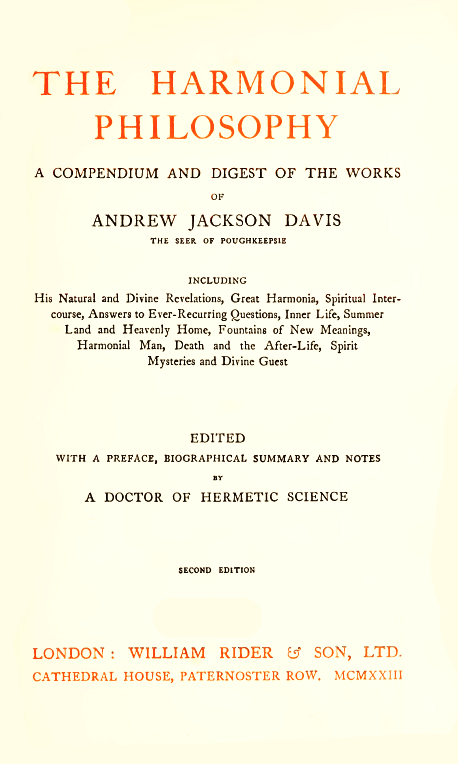

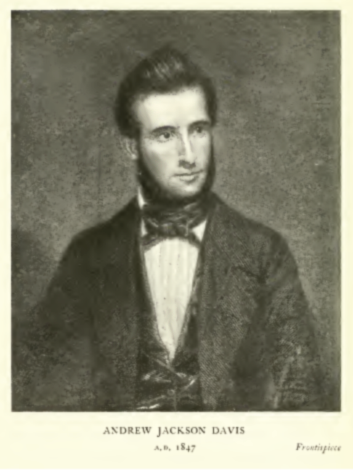
The seership of Andrew Jackson Davis was attracting wide attention in America, and in a more restricted sense was known also in England, some few years before the Rochester Knockings inaugurated the epoch of modern Spiritualism. By the hypothesis, it gave forth — like the latter — a revelation from the world beyond, and was to all intents and purposes an early example of trance mediumship, though Davis never claimed to speak under the influence of specific personal controls, like the long line of psychic orators who came after him and were, for the better part, his contemporaries. As he was, on the one hand, so much the most important of all that there is no person who could be placed in the second rank beneath him, so he has been of all the most popular. The Principles of Nature, his first book of revelations, and the only one which claims to have been dictated by him in the "magnetic" state, has passed through at the least forty-four American editions, and as there is no question that it is still in demand, it is likely to be reprinted again — perhaps many times over. It is the most comprehensive of all his writings. He wrote and published continuously during a long period of years, and his readers seem to have been no less eager than he was himself untiring, the demand for his successive volumes being always large. His collected works have been issued on several occasions, available sometimes
in single volumes separately, sometimes in complete sets only.
The reason of this popularity is not far to seek. In The Principles of Nature a philosophy of modern Spiritualism preceded Spiritualism itself, and so also a doctrine concerning the world beyond in that sphere which was held to be in immediate contiguity with the life of earth was put forward as the result of personal knowledge in seership, while later on a thousand voices coming from that sphere and, according to the claim of Spiritualism, speaking through a thousand mediums, testified to its general truth. There is no seer of the past — and there is no prophet — who had such a cloud of witnesses. The effect was greater and stronger because they did not set out to testify in favour of Davis; he was not for them the precursor of all those voices, but that which he affirmed was by them verified without reference to him. The doctrine, in a word, was that the world beyond is as natural as this world of ours; that it is neither the heaven nor hell of official Christianity; that it is simply this world spiritualised, and that men and women in their psychic bodies are as men and women here in the bodies of flesh, but with better opportunities of progress and a far better environment. They are encompassed by helpers innumerable, so that those even who pass from the life of earth in a state of hardened criminality have every encouragement to amend and ultimately never fail to do so. In a word, the gospel of Davis, in common with that of Spiritualism, cast out all fear concerning the life to come. The prototype of Davis is a still greater seer in the person of Emanuel Swedenborg; but whatever its claims and merits — about which much yet remains to be said after a new
manner — the doctrine of the New Jerusalem, according to the Swedish prophet, will bear no comparison on the ground of popular appeal with the "Divine Revelations" of him who was the Poughkeepsie seer and the exponent of Harmonial Philosophy. It is obvious that this is put forward in the only reasonable and therefore possible sense, not as a test of truth or even a title of excellence, but as a purely explanatory statement concerning a great vogue.
Whatever their deserts or defects otherwise, the postulated principles of Nature are embodied in a work which marks an epoch, and it gave a status to Spiritualism when that movement and all its host of phenomena were still in the womb of time. Later on it is evident abundantly that this movement and the revelations involved therein reacted on Davis, quite naturally and quite of necessity too. They led of course to no change of ground, for essentially they belonged to one another, but he was stimulated under their influence, and they gave him, moreover, a field, an audience, an opportunity which he could scarcely have had in their absence.
This was the position at the beginning of the new movement, and speaking as one who is acquainted with all the activities and nearly the whole literature of modern psychological and occult schools, it remains to be said that — so far as English-speaking countries are concerned — the seer and prophet of Spiritualism in its first days is even now par excellence — but I speak of excellence as judged within the limits of the schools — the prophet and philosopher, if not also the seer, of the present moment. Time has changed otherwise the actual modus videndi in many important respects. No one
speaks of a rainbow-belt among the star-clouds of the Milky Way as the world of disembodied souls. No one expresses or owns to any special view or concern about humanities of other planets and whether they proceed at death to that Second Sphere which receives souls from earth. No one accepts or denies the Davis classification of six spheres of intelligent being, with a seventh which is a Central Sun and the more particular abode of the Godhead. But of the general philosophy of Spiritualism, and of all that is weak as of all that is strong therein, Davis is the general exponent, if only because there is — practically speaking — no other who has arisen. It is difficult even now to take up a current number of any periodical devoted to the concerns of the subject and not find that he is quoted. His classification of mediumship was in all probability a matter of suspicion from the beginning, and it might be derided now, while there are many other views of his which have passed into utter desuetude; but he himself remains the spokesman at large of the subject, so far as man's place in the universe, the contiguity and interpenetration of the two worlds are concerned. On the other hand, in so far as he came forward in the guise of a scientific teacher — under "control" or psychic influence — he probably convinced few or none, even at the beginning, and he reflects now the most primitive side of the most exploded authorities. His titles to consideration are those of a seer; his visions of the world beyond are the appealing side of his seership; and for persons who accept the possibility of such experiences, there is nothing in all the annals of psychism to compare with his Summer Land. The ten thousand controls of later mediumship — except in so far as they reflect his revelations — tell us
little or nothing concerning the phenomena of physically disembodied life. He has set out all its phases, all its topography, all concerns therein, and we shall doubtless have to await the advent of another prophet before anything substantial is added thereto or altered substantially therein. Meanwhile the important investigations of psychical research, apart from professed Spiritualism, remove us by the nature of things from the philosophy of the subject, being concerned with the facts of manifestations and with tolerable deductions from these, not with the nature and pursuits of the spiritual spheres of being.
Now, the collected writings of Andrew Jackson Davis fill twenty-seven volumes, full of repetitions, verbosities and extraneous material. On account of the position which he has occupied for a period of seventy years in a movement which numbers at this day many thousands of adherents in Great Britain and the Colonies alone, it has seemed to the present editor that it would be serviceable to them and others to present — in the form of a digest — the essential parts of his doctrine, philosophy and testimony to the world of spirits and the natural law therein. The result of that undertaking is offered in this volume. As regards all that is incorporated and all that is excluded, it represents of course the personal views of the editor in respect of presumptive values, and he makes no claim to the possession of a final criterion. The work has been done with sincerity; nothing has been inserted because it appeals to him personally, apart from other considerations; nothing has been omitted because it opposes his views. Except upon points of fact those views are obtruded nowhere, and as far as possible they enter into expression nowhere. The object
has been to present the essence of Davis, and though the task as a whole has been anxious rather than easy, there has been throughout a singular satisfaction in observing how that essence has been extracted in the process of condensation without diminution of any kind, though many original pages may be represented occasionally by a single paragraph. There is no need to say that the process has involved re-expression — as it is believed, to the advantage of Davis and never to the sacrifice of the meaning which he designed to convey.* A few among those who know him may think that his anti-theological views should have been represented more fully; but enough has been given to show how he stood as to this subject. The particular circumstances under which he was born and lived denied him qualifications for judgment thereupon; even at his own period he did not represent the real difficulties of doctrine, and at the present day we are dealing with different and perhaps greater difficulties. In any case the ground has changed, and the animadversions of Davis, both in and out of season, but too often sacrificing the logical sequence of his text, were of less moment at their period than the discourses of Bradlaugh or Ingersoll and are of no consequence now. There are a few others who may feel that an undue space has been given to descriptions of the Summer Land, as Davis claims to have seen it in his "superior condition"; but without attempting to pronounce on their value, it is believed that they have been always the chief attraction of his "revelations," and that his "harmonial philosophy," apart from these as a title or warrant in seership, would scarcely demand
presentation in a new form, its great occasional insight and suggestion notwithstanding. It is in connection with these more especially that this work has been undertaken, and to mark the philosophical aspects of the claim respecting intervention between the physical and spiritual worlds.
To sum up, the message of Davis, as here presented, stands in the editor's opinion for the spirit or essence of the whole, liberated only from unwieldy accretions into which the essence does not enter, and of course separated from other extraneous matter — as, e.g. things which belong to the domain of medical formulae. It is very curious, in conclusion, to note the various points at which the Harmonial Philosophy of Davis is in quite unconscious harmony with the Hermetic Science, of which the editor claims to be a student, as also with the later theory of evolution. A few instances belonging to the first case have been cited in the notes, the most striking of all being his theory of a universal fluid, which corresponds to the Astral Light of the Martinists and to the Kabalistic so-called "light of glory." These analogies could have been traced further, but it exceeded the present undertaking, which appeals to a class of minds whose acquaintance with occult lore cannot be presupposed.
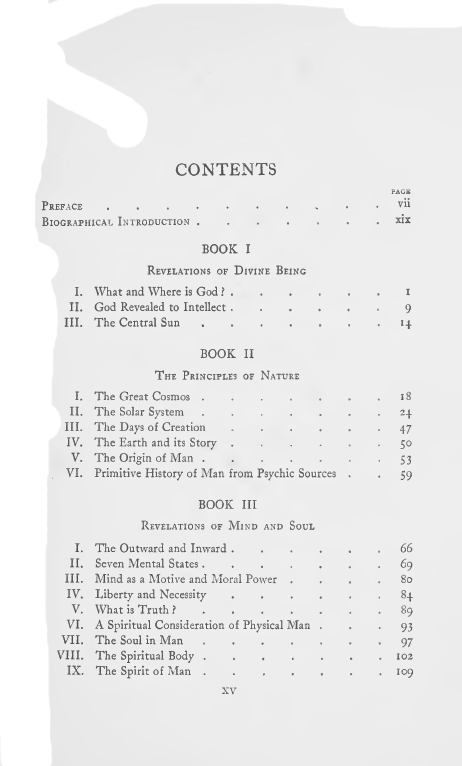
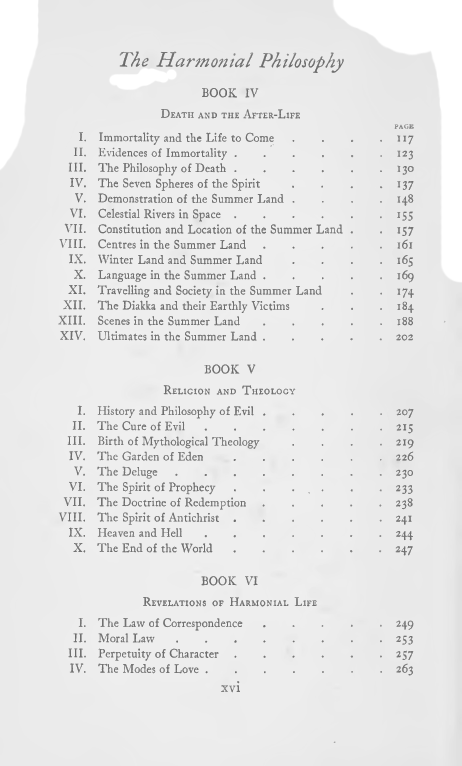
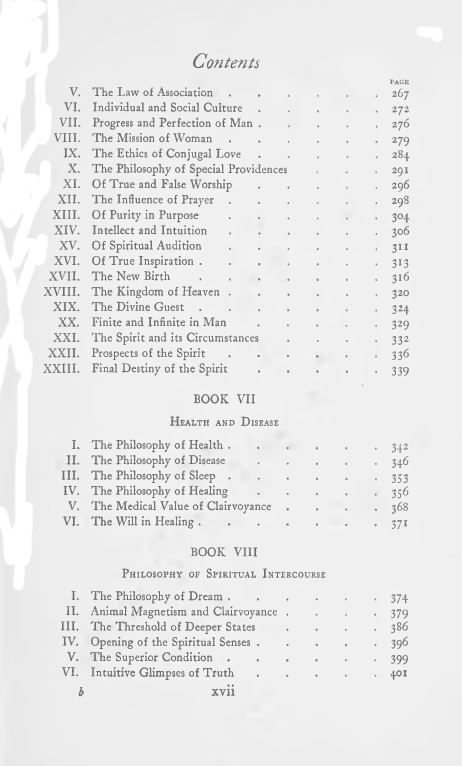
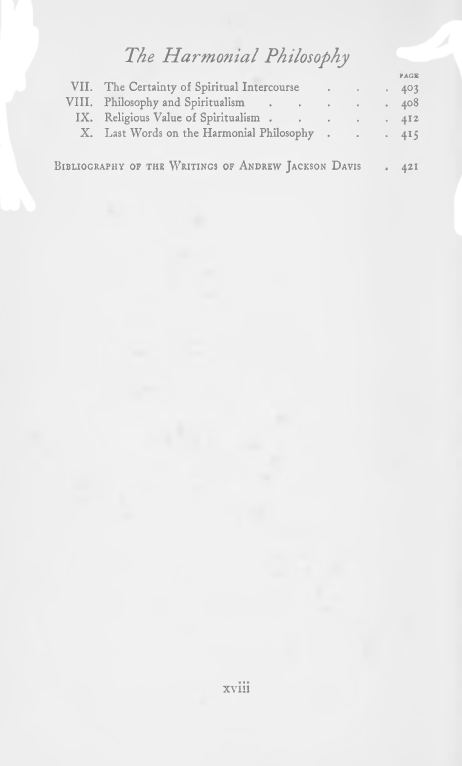
ANDREW JACKSON DAVIS was born on the 11th of August, 1826, at Bloomingrove, Orange County, in the State of New York. His father, Samuel Davis, described as a simple-hearted, unsophisticated man, followed the trade of a shoemaker and weaver, varied by haymaking and harvesting at their proper seasons. There was a moderately numerous family, the general characteristic of which was extreme poverty. Both father and mother are said — in the first autobiographical record of Andrew Jackson — to have been "destitute of the commonest education,"* meaning presumably that they could neither read nor write. Occasional intemperance — for it does not seem to have been a rooted and continuous habit — was the chief weakness of the former, in the boy's earlier days; but he worked hard, as his opportunities offered, and tried various humble schemes to improve his position, frequent migrations included. As delineated by her son, the mother "possessed a spirit of meekness and quiet, unqualified by any really positive element of character."** Davis was two years old when there was a hurried sale of effects and a removal to Staatsburgh, followed in 1832 by a second exodus, this
time to Hyde Park in Dutchess County, also in the State of New York. Here the family was stationary for about six years, when it proceeded to Poughkeepsie, where occurred those events which were to shape the future life of Davis, and in consequence of which he became and has continued to be known as the Poughkeepsie seer. His first tuition was obtained at Hyde Park village in a species of dame's school, but presently under other auspices. The experiment was highly unsuccessful and is said to have been dropped speedily, though resumed in his twelfth year — as he says — for a few weeks only, and again at Poughkeepsie, apparently in the closing weeks of 1839 and the beginning of the following year. He confesses altogether to five months of education, by the help of which he acquired some rudiments of reading, writing and ciphering. The schooling was interspersed with various humble employments, humiliating in their results as the teaching — for, according to his own description, he was dull, backward and clumsy, not to speak of timidity and an over-sensitive nature. Such as it was, his religious training was also of a haphazard kind, picked up between church and meeting-house, with little regularity at either. His mother — who shines through his early life with much patience and sweetness amidst her incessant difficulties — had, however, some elements of piety after a crude manner, and, speaking generally, he responded to her good influence, partly by sympathy and partly through natural goodness in his own character. In the early part of 1841 her death put an end to their companionship. The main points of his record during the period which followed this loss, as indeed previously, are concerned with miscellaneous and mostly abortive efforts to retain such employment as came in his way.
There is no reason for reciting them in this place, and the narrative may pass therefore to that period and occurrence which was to influence his entire life and reveal his future vocation.
At the close of 1843, Andrew Jackson Davis being seventeen years of age, an itinerant phrenologist and mesmerist, named Grimes, appeared at Poughkeepsie and lectured on Animal Magnetism. Davis attended and was one of the subjects on whom the "professor" tried certain experiments, but in this case unsuccessfully. There was, however, a tailor in the village, by name William Levingston, who — as the result of Grimes' visit — made a trial of his own powers in producing magnetic phenomena. He appears to have achieved considerable success, and Davis came at length into his hands. On the very first occasion it is affirmed that "the boy exhibited powers of clairvoyance which were truly surprising." This is on the authority of William Fishbough, whose introduction appears in every edition of The Principles of Nature. Davis, on his part, records the circumstances and his recollected experience at length in the work already quoted.* He describes his first sensations when the operator's hands passed and repassed over his head, the momentary illumination which followed, the intense darkness thereafter, a conviction of actual dissolution, the transitory and vain struggle against the whole operation, and the consciousness that he was lying supine — incapable of all physical motion. Thereafter, as he tells us, consciousness was itself suspended and the rest of his account embodies that which he heard from others. In the presence of
witnesses, and with eyes bandaged, he had read from a newspaper, told the time by a watch, described the complaints from which certain spectators were suffering — in all cases with accuracy. This experiment took place on December 1st, 1843.
Davis frequented Levingston's parlour night after night, not without "inexpressible apprehensions," but with uniformly successful results. "At each session some new truth or interesting wonder would make its appearance,"* the operator freely admitting all whom curiosity or expectation drew towards the new prodigy, thus manifesting in the little community. The result was an exceedingly mixed audience, with considerable notoriety for the subject, not unmixed with hostility and even persecution. On January 1st, 1844, Davis, according to his story, made his first psychic "flight through space,"** though his recollection concerning it appears to have come long after the event. He describes himself as "born again" in the spirit. "It seemed that the whole earth, with all its inhabitants, had been suddenly translated into some Elysium." He saw not only the encompassing auras of the various spectators, but their physical bodies became "transparent as a sheet of glass" and "invested with a strange, rich, spiritual beauty." He beheld within the veil every separate material organ and the peculiar emanations by which each was surrounded. It is claimed also that behind the "real physical structures," he became conscious of the "indwelling essences and vitalic elements." This was the first stage of his vision, and the second brought within his field of consciousness the furniture in the
room about him and the walls by which it was enclosed. The walls dissolved, and he could see into the adjoining house. This was the second stage, and he passed thereafter into what he terms a deeper sleep, in which, "by a process of interpenetration," he was "placed en rapport with Nature." He became aware of "a high and eternal communion," as between that which was within him and that which is alive in the world. The earth opened to his view, and he explored the mineral kingdom, the properties and essences of plants, and the internal physiology of the animal creation. He saw something also of man, in the sense that all animate nature was working up towards humanity.*
On another occasion, the date being March 6 of the same year, the magnetic condition was induced as usual, but experiencing a painful impression from what is termed the "spheres" of the sitters, he quitted the operator's premises, and being still in the subjective state, called at the house of a clergyman, proceeding thence to the operator's private residence — where he was staying at the time — and there going straight to bed. He awakened, still under the magnetic influence, dressed and went out into the street, passing from point to point "with a fleetness indescribable." It was still night, and "under the heavenly archway" he appeared to stand alone, "unseen by any save the eye of the
Eternal Being." An allegorical vision followed, concerning "a shadowy congregation of clean and beautiful sheep" and their shepherd — "a kind and gentle being, endowed with physical and spiritual perfection." The flock represented humanity and the herdsman was a reformer among it whose mission was to overcome ignorance and confusion therein. The part of Davis in the vision was to help the shepherd in his tending, which was at length accomplished, after which the flock and its guide proceeded onward and vanished in the distance. The scene changed presently, and he was across the river Hudson, now overcome with fatigue, again restored inwardly, now in storm and darkness, again under a clear sky in the daylight, now conscious of sleeping, then of awaking, and finally finding himself in an utterly strange region. Once more he beheld a scattered crowd of sheep, striving to climb a hill, and a shepherd like the former one, whom he was also called to help, with similar results. At a later period teachers came to himself, and between their visits he inquired of a person in a farmer's dress how far it was to Poughkeepsie. He was told that it was about forty miles. He began travelling homeward, alternately sleeping and running. Part of his instructions were concerned with the art of healing, but this also was conveyed figuratively; and part told him that through his mediation new light would come to mankind. All this time he was travelling in the physical body, though only conscious in the spirit. At length he reached Poughkeepsie and returned to the house of Levingston, having been absent since the previous night. It was not until he had eaten a hearty meal that he regained his normal sensibility.
He was magnetised as usual on the following evening,
and then proceeded to explain the moral of his recent visions. They signified a complete change, an end to the gratification of curiosity and the advancement of magnetic science by devoting the clairvoyant faculties of the seer exclusively to the healing of the sick. The limits of sittings were fixed, the manner of conducting the magnetic process was prescribed, and it was laid down that there should be no charge for consultation except to those who were in "easy circumstances." Davis represents his operator — the tailor, Levingston — as having an abundant and profitable business; but he was a man inspired with the love of humanity, and this to such an extent that, encouraged by his wife, he gave up his trade to follow the course outlined by the young seer. A clairvoyant clinic was opened accordingly, beginning at Poughkeepsie and extended afterwards to Bridgeport, Connecticut, operator and subject living as they could upon the proceeds which came into the common coffer. But as the days drew towards the summer of 1845, Davis was in labour with the undetermined sense of another mission, a wider and more important field of labour, concurrently with which he became acquainted with Dr. S. S. Lyon of Bridgeport, apparently an ordinary medical practitioner, whom he convinced of the truth of clairvoyance. Now, Davis in his entranced condition had delivered already some two or three lectures, and as the horizon cleared inwardly before him he saw that his coming work lay in this direction, or to put it quite plainly and boldly, a book was to be delivered in sections, in the magnetic state, and reduced into writing by a scribe present on the occasions. There was to be one magnetiser and there was to be one scribe only. So did Davis, something less at the date in question than twenty
years old, enter upon a new phase of his career, and the connection with his previous operator came to an end abruptly, for, while in the clairvoyant state, he "voluntarily chose Dr. Lyon to be his magnetiser during the delivery of this book,"* the reporter — similarly selected — being the Rev. William Fishbough, of New Haven, Connecticut — probably a universalist minister. As the seer decided further that the "revelations" must take place in New York, rather than Bridgeport, Dr. Lyon relinquished "a remunerative and increasing practice," with the result that another clairvoyant clinic had to be opened at the new centre as a visible means of subsistence for operator and subject during the long course of the lectures.
In addition to operator and scribe, three permanent witnesses were selected, "so that the world through them might know from what source these revelations flow."** They were the Rev. J. N. Parker, Theron A. Lapham and Dr. T. Lea Smith — of whom little or nothing is known at this day, beyond the brief references of Davis. The lectures, to the number of one hundred and fifty-seven, were delivered at 92 Greene Street, Manhattan,
from November 28th, 1845, to January 25th, 1847, apart from any public announcement, a few persons being privately notified from time to time. The remarkable scheme had therefore no financial aspect, so far as its chief actors were concerned. As regards procedure, it will be sufficient to state (a) that the subject was hoodwinked, as was the case also in the previous experiments and throughout the diagnoses generally; (b) that he was put invariably into the magnetic condition; and (c) that the seer dictated to the operator slowly and in a low voice, the operator repeating the words aloud, making sure that they had been heard correctly, after which they were written down by the scribe. The source of information was claimed to be "the spiritual world," but apart from any special personality, thus constituting — at whatever may be its importance and value — one salient distinction between the Davis communications and a considerable proportion of those which characterised the séance through many subsequent years. In a word, the Manhattan orations were the first to be delivered in trance, the inspirational poems of Thomas Lake Harris coming probably next in time, as they do certainly in importance.
In the digest which follows, The Principles of Nature — into which the lectures developed — will speak adequately for itself. Here it will be sufficient to add a word only on two external facts. The means for its publication came at the right moment — as they seem to come always in cases of this kind — through the munificence of private sources; and the work was prepared for the press by William Fishbough, who gives a scrupulous account as to his hand therein. The following heads of particulars are worth noting, as indications of his personal good
faith. He made needful corrections in grammar, pruned certain verbal redundancies and elucidated some obscure sentences. He altered nothing in respect of ideas and, moreover, added nothing. With these unimportant qualifications, he bears witness that the work, in its published form, "may be considered as paragraph for paragraph, sentence for sentence, and word for word, as it was delivered by the author." With one exception, the appended annotations were those of Fishbough; but they were very few and unimportant, and have not been reproduced here.
A little prior to the publication of this work, Davis felt that what he terms the second magnetic crisis of his life was on the threshold or within the door. As a fact, he was put to sleep by Dr. Lyon for the last time on April 10th, 1847, and he looked in other directions for the "further development of his powers." Such at least was the testimony of Thomas Lake Harris, the inspirational poet, who had become acquainted with him at this time and is claimed to have looked for his guidance during a brief period. On August 11th, Davis attained his twenty-first year, when it was proposed to establish a "reform paper," to be entitled The Univercoelum with Dr. S. B. Brittan as editor-in-chief. He was another friend of that season and well known in the circles of liberal thinking, as he was subsequently in the spiritualistic movement for a considerable number of years. The project was brought to birth, and Davis was one of the contributors; but adequate capital was wanting for such a venture, and its struggle for existence ceased at the end of 1848. In the meantime, or specifically on July 1st, 1848, Davis was married to the woman whose generosity had mainly made possible the pub-
lication of The Principles of Nature. She was much older than himself and had occasion to secure a divorce from her first husband before the union could take place.
The history of this period is really that of the liberation of Davis from the leading strings of magnetic operators. He was conscious and has put on record the fact that he could enter "the superior state" whenever circumstances and his own will demanded it.* Under these circumstances, and without — as he tells us — the aid of any scribe or help from other books, he began writing the first volume of his next most considerable work, The Great Harmonia. This was during the autumn of 1849 and the spring of the following year. In this manner there passes into record the beginning of that psychic, intellectual and literary life which Davis was to lead henceforward. His books are its landmarks, and to all intents and purposes they represent it so fully that the bibliography of his writings at the end of the present volume might be taken as a sufficient supplement to the present biographical note. Everything else is transitory and its interest has perished long ago, as those who at this day may undertake the experiment of reading The Magic Staff and Beyond the Valley, which are his memoirs very much at large, are likely to find to their cost.
Here it will be sufficient to say that she who was his first wife died on November 2nd, 1853, and on May 15th, 1855, he was married for a second time. As Mrs. Katie Dodge secured a divorce with the intention of marrying Davis if and when it was obtained, so Mrs. May Love was moving for similar liberation when that which Davis
terms his "clairvoyant penetration" had discovered a "genuine fitness" between her soul and his. The second union continued for something like twenty-nine years, when it was terminated on November 18th, 1884, in a letter which Davis wrote to his wife, addressing her as "my companion in the work," and this course was subsequently clinched by a nullity decree, on the ground that the divorce obtained from Mr. Love in 1854 by Mary Love "was not sufficiently valid in the State of New York," where Davis married her subsequently.* Mary Davis raised no plea against the proceedings and — apparently with a broken heart — reassumed her maiden name of Mary Fennell. This is enough to register in the present place concerning a particularly painful business.
Davis appears to have entered the married state for a third time, as it has been stated that "his beloved wife," Delia, "ministered to his last earthly needs" at the time of his death. For the rest, he was an active and ready lecturer on the Harmonial Philosophy. He was connected, editorially and otherwise, with several periodicals, among others The Herald of Progress, and, generally speaking, with a number of "reform" movements. Moreover, in or about the year 1886, having taken up the study of medicine through the authorised channels, he earned and received his diploma of M.D. from the United States Medical College of New York. Though he claimed always to be guided by an inward light and to possess, as we have seen, the power to pass continually and volun-
tarily into higher psychic conditions, in which the unseen world opened its vistas before him, The Principles of Nature is the only work which he dictated in an entranced state, so that it stands in a category by itself when compared with his later writings. It has certain manifest resemblances with the revelations of Swedenborg, and it may be noted that Davis claimed the Swedish seer as one of his early "guides." He took exception, however, as we have seen, to the notion that he occupied the position of a medium in relation to any spirit, "as if my mind — while in the superior condition — were an insensible, unintelligent and passive substance or spout, through which disembodied personages express or promulgate their own specific opinions." The remark has reference to The Principles of Nature, and Davis describes with considerable detail his mental state as one of "watching and analysing" on the night that its dictation began and when he was like a "conscious mirror . . . on which were reflected and in which were focalised the principles and properties of the System of Nature." His magnetisation or entrancement produced therefore only a suspension of physical faculties which — ex hypothesi — liberated and extended his interior powers. No seer of ancient or modern times has given so lucid an account of his psychic states, as remembered subsequently.
While The Principles of Nature is accurately described in the preface to the present volume as the most comprehensive of all his writings, it is of course not the most mature. Personally Davis preferred Penetralia to any of his other books, on the ground that it was "the wisest," an opinion probably endorsed by very few of his readers. In any case it is believed that he is represented
at his best by no one work but rather by that harmony and digest of all which is presented here. "The Poughkeepsie seer" departed this life on January 13th, 1910, and since his entrance into the Summer Land there seems no evidence of his communication with "the first sphere."